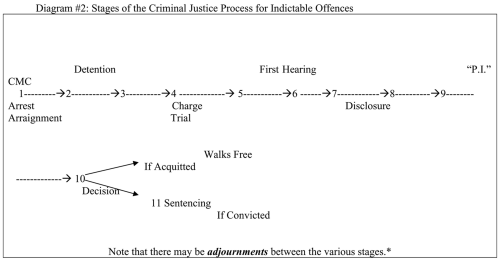BELIZE CITY, Thurs. Sept. 14, 2023
I am often called by frantic strangers, acquaintances, and even friends – asking, “I have my first court date tomorrow! I am not ready for trial! What should I tell the judge?”.
Relax! The judge doesn’t want to hear about the details of your case yet! It will be months or even years until your trial!
This Article will very briefly explain the entire criminal justice process.
First, it is critical to understand that there are three types of criminal offenses in Belize, and the three have slightly different processes.
a. Summary Offenses – tried at the Magistrates’ Court
b. Indictable Offenses – tried at the High Court
c. Hybrid Offenses – can be tried either at the Magistrates’ Court or the High Court
It is obvious that Indictable Offenses are more serious in nature than Summary Offenses, and Hybrid Offenses are intermediate in terms of their severity. It follows then that Indictable Offenses carry harsher penalties than Hybrid and Summary Offenses.
The Arrest
The criminal justice process generally starts when a suspect is arrested by the police. An arrest is the initial apprehension of a suspect.
Detention
If the police believe that they have apprehended the correct suspect, the police have the right to detain that suspect up to 48 hours before laying a charge. During this time, the suspect is detained at the police station. The police may use the time to gather further evidence if necessary, and to prepare and finalize the charge.
(It is to be noted that while the law allows the police to detain a suspect up to 48 hours without charging, the law does not allow the police to abuse this time frame. So for example, if it becomes apparent to the police 2 hours into a suspect’s detention that the suspect is innocent, he/she should be released immediately.)
Charge
If the police have sufficient evidence which points to the guilt of the suspect, the police may charge the suspect for the appropriate crime. Once charged, the suspect is now referred to as a Defendant. It is illegal for the police to detain a suspect longer than 48 hours without laying a charge. Further, while police may think it ingenious, it is illegal to release a suspect at the expiration of 48 hours and then immediately detain the suspect again for another 48 hours without significant new evidence.
First Hearing
After the defendant has been charged, he/she must be taken before a magistrate at the first practical opportunity; this is called the First Hearing. From here, the Criminal Justice Process is slightly different for Summary Offenses versus Indictable Offenses; as such they will be explained separately.
- SUMMARY OFFENSES
First Hearing
At the First Hearing, if the offense is a Summary Offense, the defendant will be Arraigned – this means that the charge will be read to the defendant and he/she will be asked to enter a plea of either guilty or not guilty.
If the defendant pleads guilty, the magistrate will set a date for Sentencing. If the Defendant pleads not guilty, the magistrate will proceed to set an adjourned date for Disclosure. At the First Hearing, the magistrate is also required to consider whether to release the defendant on bail.
Disclosure
Disclosure means that the prosecution must give to the defense all the evidence which it has gathered against the defendant. This may include witness statements, reports, photographs, video recordings, and other evidence. Disclosure must take place within 8 weeks of the First Hearing. Disclosure is required because defendants have a right to know the case against them so that they can adequately prepare to defend themselves either personally or with an attorney.
Case Management Conference
At the Case Management Conference, the case is managed by a magistrate, the prosecution and the defense with a view of ensuring that the case runs smoothly during the trial. As such trial issues are identified, witness statements may be agreed upon, inadmissible evidence may be struck out, trial dates are scheduled, and so forth.
Trial
At the trial of the matter, a prosecutor has the burden of leading evidence through witnesses in order to prove that a defendant is guilty beyond a reasonable doubt. The defendant may or may not be represented by a Defense Attorney. The role of a Defense Attorney is to protect a defendant’s rights and to defend the charge against the defendant. A magistrate will listen to the case, essentially serving in the role of a referee – remaining neutral and ensuring that the trial process is fair to both sides. Ultimately, the magistrate will determine the guilt or innocence of the defendant based on the evidence presented in court. For Summary Offenses, the trial must take place within 9 months of the First Hearing.
Conclusion of Trial – Conviction or Acquittal
At the end of the trial, the magistrate will give a decision as to whether the defendant is convicted (Guilty) or acquitted (Not Guilty) of the offense. If the defendant is acquitted, he/she walks free. If the defendant is convicted, the case is adjourned for Sentencing.
Sentencing
At the Sentencing Hearing, after hearing from both sides (prosecution and defense), the magistrate will decide on an appropriate sentence, which generally includes a fine, jail time or both.

- INDICTABLE OFFENSES
First Hearing
The First Hearing of Indictable Offenses are also conducted at the Magistrates’ Court before a magistrate. Like Summary Offenses, for Indictable Offenses, after a defendant has been charged, he/she must be taken before a magistrate at the first practical opportunity. The difference as opposed to Summary Offenses, is that for Indictable Offenses, the magistrate is restricted from taking a plea from a defendant because the matter is to be dealt with by the High Court. The charge will nonetheless be read to the defendant in court, and the magistrate will consider whether to grant the defendant bail or remand him/her to prison. The magistrate will then adjourn the case for disclosure.
Disclosure
Disclosure for Indictable Offenses also takes place in the Magistrates’ Court and it follows the same principles as set out above for Summary Offenses; the prosecution is required to give to the defense a copy of all the evidence gathered against the defendant. Disclosure must be given by the prosecution to the defense at least 14 days before the Preliminary Inquiry.
Preliminary Inquiry
The Preliminary Inquiry, often referred to as “P.I”, is also conducted in the Magistrates’ Court. The Preliminary Inquiry is a hearing where the magistrate decides whether the case has sufficient evidence in order to send it up (commit it) to the High Court for trial. In other words, it is the process where the case transitions from the Magistrates’ Court Level to the High Court Level for trial. In Belize, most Preliminary Inquiries are rarely contested and as such have been reduced to a mere formality termed “Paper Committal”. Obviously, only Hybrid and Indictable Offenses have Preliminary Inquiries; Summary Offenses don’t. The Preliminary Inquiry must take place within 6.5 months after the First Hearing.
Arraignment
After the case has been committed for trial in the High Court, a defendant’s first appearance before the High Court will be for Arraignment. This means that the charge on the Indictment will be read to the defendant and he will be asked by a judge of the High Court (not a magistrate) to enter a plea of guilty or not guilty.
If the defendant pleads guilty, the judge will set a date for Sentencing. If the defendant pleads not guilty, the judge will proceed to set an adjourned date for Case Management Conference (“CMC”).
Case Management Conference
For Indictable Offenses the Case Management Conference is conducted in the High Court by a judge along with the prosecution and the defense, and it serves the same purpose as that set out above for Summary Offenses.
Trial
Depending on the type of offense, the case is tried before a judge alone or a judge along with a jury. Except for jury trials, the trial process in the High Court is similar to that described above in the Magistrates’ Court. The judge essentially plays the role of the referee, ensuring that the trial process is fair and listening to the evidence from both the prosecution and defense and ultimately determining the guilt or innocence of the defendant. Many lay persons mistake the prosecutor’s role for that of the judge – thinking that it is the judge who is responsible for proving a defendant guilty. For Indictable Offenses, the trial must take place within 2 years of the First Hearing; this time limit is rarely ever met.
Conclusion of Trial – Conviction or Acquittal
At the end of the trial, the judge or jury will give a decision as to whether the defendant is convicted (Guilty) or acquitted (Not Guilty) of the offense. If the Defendant is acquitted, he walks free. If the Defendant is convicted, the case is adjourned for Sentencing.
Sentencing
At the Sentencing Hearing, after hearing from the two sides (prosecution and defense), the judge will decide on an appropriate sentence which generally includes a fine, jail time or both. Note that there is a difference between a “fine” and “compensation”. A fine is paid to the state. Compensation is paid to a citizen who has suffered damage and/or loss. Generally, the Criminal Division of the court is not so much concerned with compensation. Therefore, if a complainant wishes to be compensated for any loss and/or damage, generally he/she must file a civil suit.
Possible Adjournments
It is to be noted that between the various stages of the process, there may be several adjournments whereby the court postpones the case to a later date. Adjournments may be granted for various reasons which may include the parties (defense or prosecution) requiring more preparation time, clashes in the court’s schedule with other cases, absence of legal representation, unavailability of counsel, absence of witnesses, and several other reasons. These adjournments often delay the process.

- HYBRID OFFENSES
Hybrid Offenses can be tried either at the Magistrates’ Court or at the High Court. The prosecution, the magistrate and for some offenses, the defendant make the decision whether a Hybrid Offense should be tried either at the Magistrates’ Court (i.e. summarily) or at the High Court (i.e. on Indictment). If a Hybrid Offense is tried at the Magistrates’ Court, it will follow the process for Summary Offenses outlined above. If a Hybrid Offense is tried at the High Court, it will follow the process for Indictable Offenses outlined above. An example of a Hybrid Offense is Arson. If a defendant is accused of burning down a house (Arson), he will likely be tried in the High Court. If another defendant is accused of burning up her ex-lover’s wardrobe (Arson), she will likely be tried in the Magistrates Court.
Sincerely,
Observant Front Line Prosecutor / BTNP
Attorney-at-Law

